
By:
- Brittany Hook
Published Date
By:
- Brittany Hook
Share This:
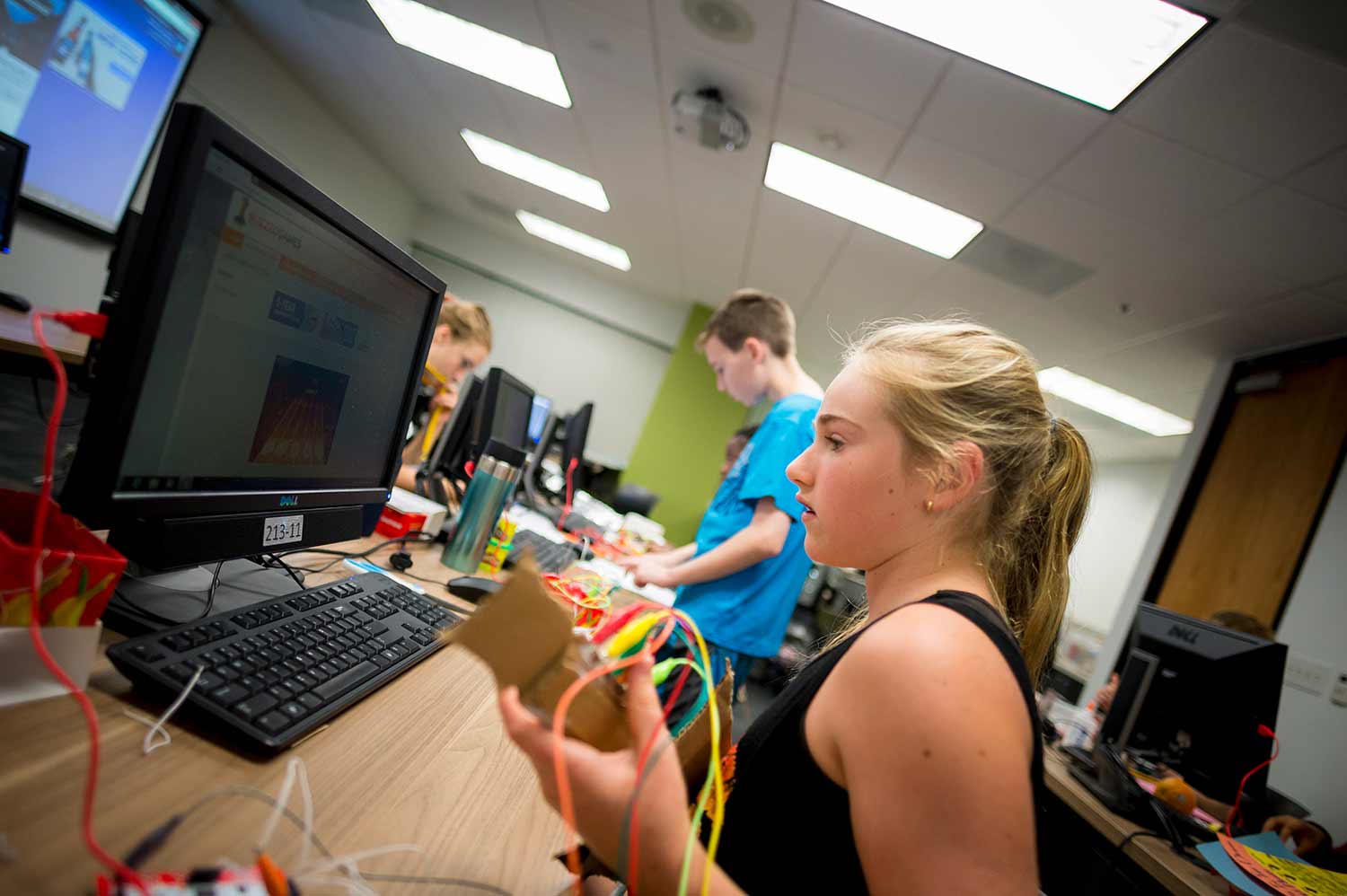
Science and art collide in the “Makey Makey” class, where the technology of circuits is used to create art in the form of music and games.
Summer Programs at Sally Ride Science Designed to Inspire Youth
Scripps Oceanography researchers and grad students to serve as instructors, mentors for summer classes
Pirate Science. Slimy Sea Creatures. Music of Earthquakes.
Based on the class names alone, it’s clear that the summer workshops offered at the Sally Ride Science Junior Academy are anything but ordinary.
This summer will mark the second year that the Sally Ride Science Junior Academy will offer a range of innovative science, technology, engineering, arts, and math (STEAM) workshops for middle- to high school-age students. These hands-on learning experiences are taught by top-notch instructors, the majority of whom are affiliated with Scripps Institution of Oceanography at UC San Diego.
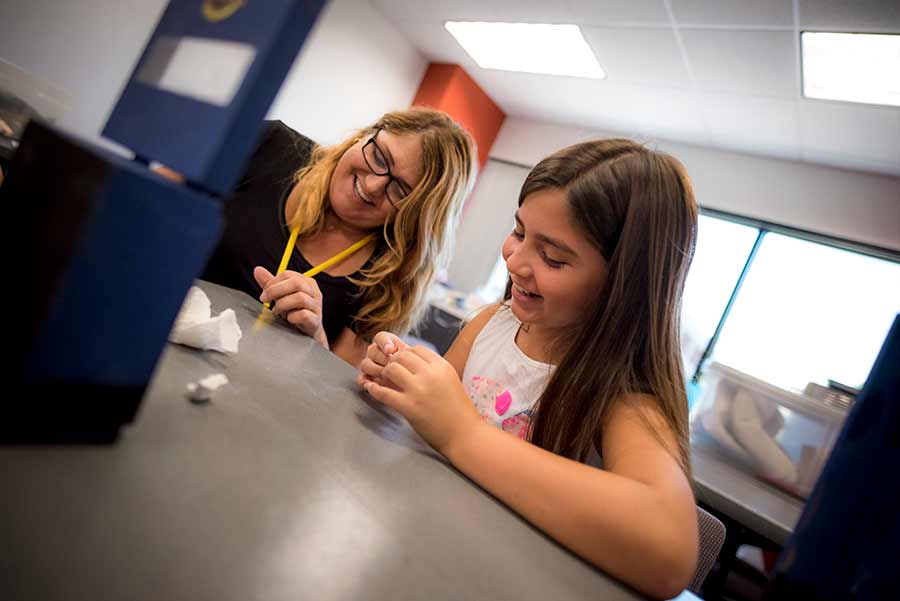
A student forms an eyeball out of clay in the "Deep Sea Exploration” workshop, which examines the bizarre creatures that dwell in the abyss.
Sally Ride Science is an education company that Ride, the first American woman in space, co-founded in 2001 to ignite student enthusiasm for science. In 2015, Sally Ride Science was relaunched as a non-profit entity at UC San Diego. Its programs are coordinated by UC San Diego Extension, Scripps Oceanography, and the San Diego Supercomputer Center.
Scripps seismologist Debi Kilb is the science outreach director of the Junior Academy and works to bring immersive art and science programs to San Diego youth. In addition to vetting the courses and hiring the instructors, she teaches the “Music of Earthquakes” course and serves as a mentor and role model to students.
“My goal is to connect with those students who would be excellent scientists, but for some reason fall through the cracks, to help them find their passion and career track,” said Kilb. “I want to show these students that you don’t have to just pick science or just pick arts. There’s a very vibrant and creative intersection where you can do both.”
Ed Abeyta, associate dean of community engagement and director of pre-college programs at UC San Diego Extension, said it’s clear that educators in the San Diego region and beyond need to provide more opportunities for students to access this “best-in-class” STEAM education.
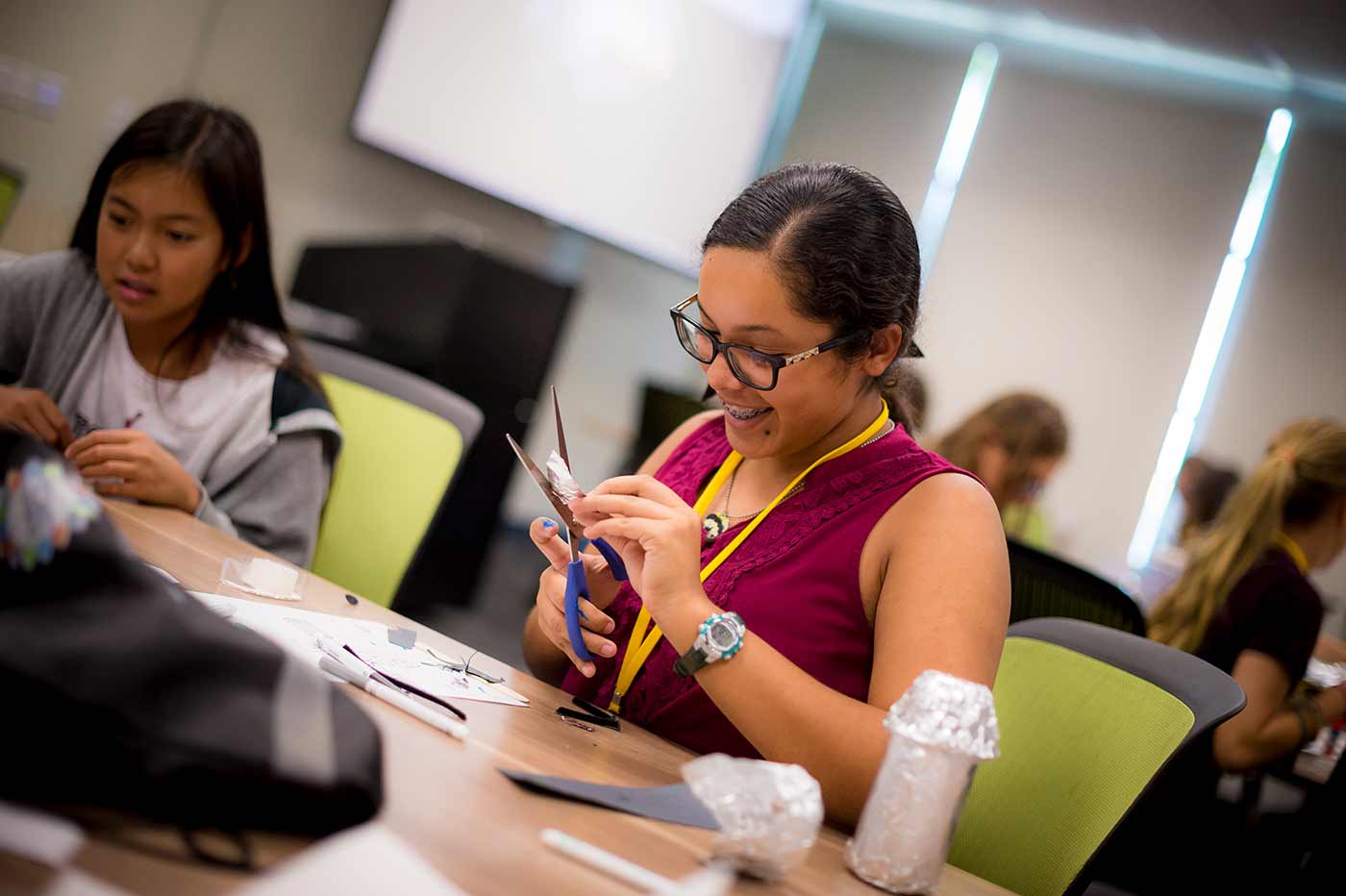
Students in the “Space Out” class design their own rockets, which they test at an outdoor launch pad.
“We have seen huge interest and demand for this type of STEAM programming. It’s creative and it’s fun but it also exposes students to new skills and opportunities,” said Abeyta. “I think the reason kids and parents are drawn to the Sally Ride Science programs is because of the quality of the instruction. They are able to learn from the best and the brightest and our partnership with Scripps Institution of Oceanography is a critical component to our success.”
The Sally Ride Science STEAM workshops will be held at Mission Bay High School this summer with the first session beginning June 26 and the last session ending July 21. During the weeklong workshops, students assume the roles of space explorer, ocean engineer, computer scientist, and more as they immerse themselves in hands-on projects. Classes have an average 8-to-1 student-teacher ratio, giving students ample individual time with instructors.
Ten of the 19 instructors for this summer’s programs are affiliated with Scripps Oceanography, with experts including scientists, postdoctoral researchers, graduate and master’s students, and alumni.
Scripps graduate students Dara Goldberg, Dallas Sherman, and Katia Tymofyeyeva will be teaching a class titled “Space Out,” in which students will learn about the earth, the planets in our solar system, and far-away galaxies. Students will also have a chance to design and build their own miniature spacecraft and plan their own space mission.
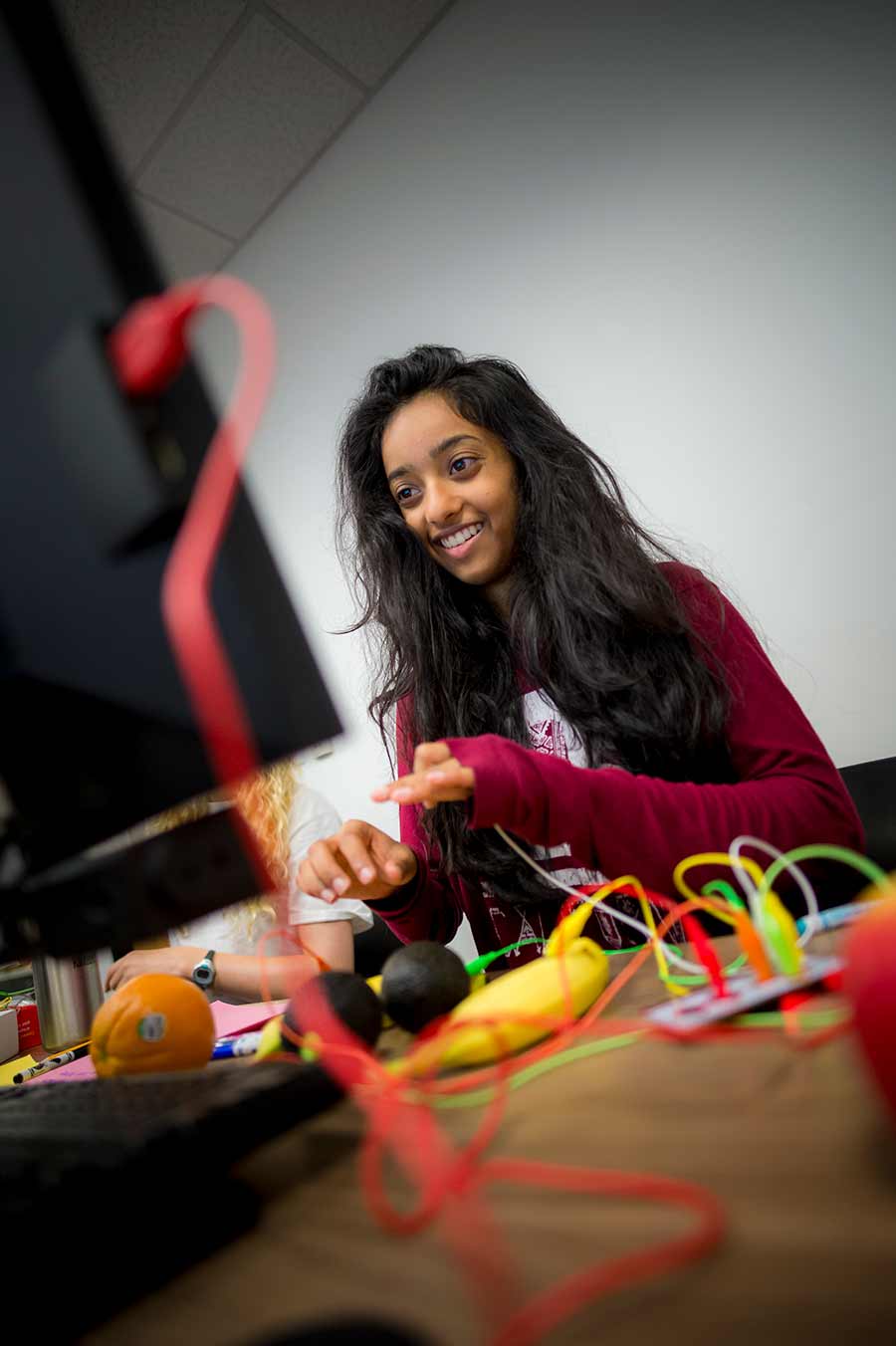
A student uses circuitry and fruits to design a playable "fruit piano” in the “Makey Makey” class.
Sherman and Tymofyeyeva developed the “Space Out” class last year, and they hope to improve upon it this year, along with Goldberg.
“Last year I was so inspired by the curiosity, initiative, and excitement of my students,” said Tymofyeyeva, a fifth-year Ph.D. student in the earth science program. “My biggest hope is that students will be inspired to continue exploring the earth, the solar system, and the universe when they leave the class.”
Fellow Scripps graduate student Paul Chamberlain is ramping up to lead a nautical arts-themed class for high schoolers this summer titled “Pirate Science.” Students will learn the elements of celestial navigation, sword fighting, weather prediction, knot tying, ship construction, and sailing.
“In a former career, I used to drive ships for a living and gained a real appreciation for the primitive navigational arts. I hope to share some of these skills and express them in the context of modern earth sciences,” said Chamberlain, a third-year Ph.D. student studying physical oceanography. “I am at Scripps because I am passionate about understanding and communicating science. Teens have a lot of questions and enthusiasm, so I am excited to share what I know and draw inspiration from their curiosity.”
Scripps Geological Collections Manager Alexandra Hangsterfer will return to Sally Ride Science this summer to teach a class called “Messy Science.” Middle school students in this hands-on course will design, build, and test projects—and sometimes even eat them. For example, students can create edible earth layers out of Jell-O, pudding, cookie crumbles, and gummy worms. These interactive and often messy experiments teach students the scientific processes behind events like earthquakes, volcanoes, cloud formation, sea-level rise, landslides, and more.
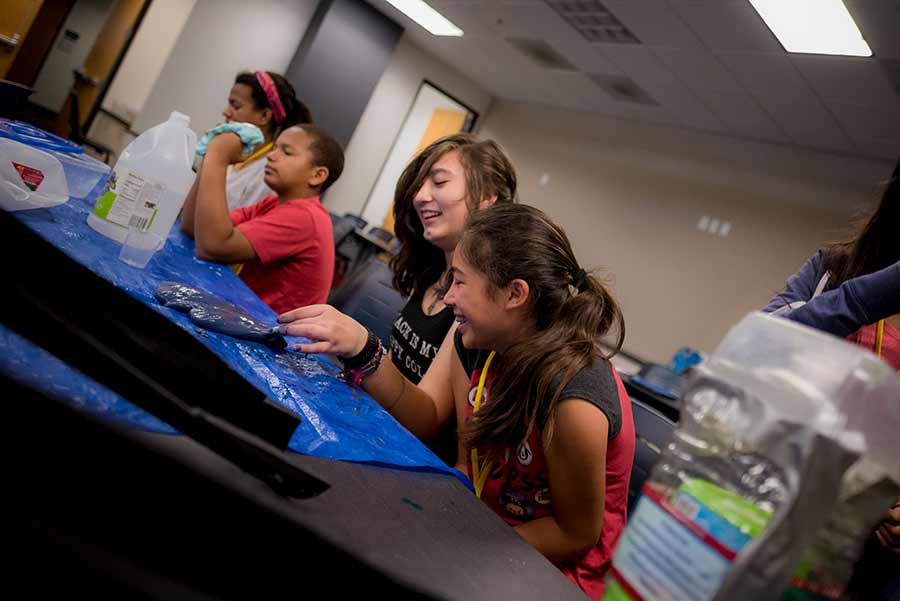
Exploring flubber in “Messy Science” — the philosophy in this class is the messier the better.
“What I really hope students take away from this class is that science is really fun, from learning it to teaching it, and that all you need is an open mind and a sense of wonder to truly enjoy learning,” said Hangsterfer. “Last summer was such a positive experience and the endless smiles on the students’ faces was definitely a sign that they were having fun while learning. I can't wait to teach a new group of students again this year!”
Last year, a total of 453 students attended the academy, and a large portion of the attendees were scholarship recipients, receiving free tuition, bus service, and free lunch for those who needed it. The scholarship program will continue this year, providing access to quality educational opportunities for those in need.
In true Sally Ride fashion, the workshops will also incorporate real-life stories of vibrant women conducting research in each field. These examples will serve as inspiration to students and help make STEAM careers more accessible.
Kilb said she is looking forward to leading this summer’s programs, which are educational but also might entice students who wouldn’t normally take a summer class.
“The summer academy has an equal focus on science and fun,” said Kilb. And most importantly, she added, “no tests!”
Interested in learning more? Visit Sally Ride Science Junior Academy for full course descriptions and registration info: wwww.sallyridescience.com/junior-academy/.
Share This:
You May Also Like
Stay in the Know
Keep up with all the latest from UC San Diego. Subscribe to the newsletter today.


